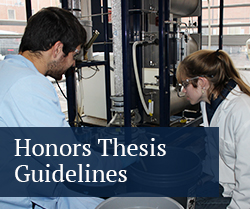Chemical Engineering Honors Program
Prospective Honors Students
All incoming freshman and transfer students are eligible to apply for admission to the Schreyer Honors College (SHC) at Penn State. Students in the SHC are, first and foremost, Penn State students and experience everything the University has to offer. There are distinct opportunities afforded to Schreyer Scholars, however, some of which include:
- Academic enrichment including honors courses, exclusive study abroad programs, and research placements
- Dedicated honors housing in two residence halls that establish a vibrant setting for learning and living
- The distinction of graduating with honors from Penn State upon successful completion of the SHC’s academic requirements
- Financial Support: Incoming freshman Scholars receive a $4,500 Academic Excellence Scholarship. Additional financial support includes grants for travel, research, and internships throughout the student’s academic career.
Admission to the honors program is limited and requires the completion of an SHC application in addition to the Penn State Undergraduate Admissions Application (you will find a link to the Honors College application through the general Penn State application). The SHC’s overall enrollment of 1,800 Scholars represents just five percent of Penn State’s total undergraduate student population.
For more information about the Schreyer Honors College including FAQs, admission requirements and information on how to apply please visit the Schreyer Honors College website.
Current Honors Students
Undergraduate Thesis
All honors students are required to complete an undergraduate thesis before graduation. Students should initiate their thesis by the second semester of their junior year, however, it is preferable to have started research before that time. The thesis topic is at the student’s discretion and should be something that the student finds personally engaging.
Selecting a Thesis
Selecting an undergraduate thesis topic is the responsibility of the student and allows for a great degree of versatility. The student should select a topic that is personally appealing and allows for new exploration and discovery. Don’t be afraid to think outside of the box when weighing possibilities for the thesis. Please refer to the CHE Honors Thesis Guidelines with any questions. The SHC also offers a thesis planning guide to assist students.
Discover faculty research within the department
There are a number of ways to select a thesis topic. Many students begin by analyzing current faculty research and identifying a potential adviser based on their research interests. Once a potential adviser is contacted, he or she will be able to provide thesis recommendations and connect the student with other honors students who have already selected thesis topics (both past and present).
Explore possibilities outside chemical engineering
It is possible to pursue an honors designation outside of the department of chemical engineering (math, chemistry, etc.). In those circumstances, the student’s degree will be conferred with honors in the major in which the thesis was conducted, e.g., Bachelor of Science in Chemical Engineering with honors in XXX. It may be possible to graduate with honors in chemical engineering while a thesis is supervised by a faculty member in a different department. The chemical engineering department has recently added a large number of affiliate faculty with primary academic appointments in other departments. These faculty members can serve as advisers in chemical engineering. Additionally, you may also arrange an adviser in another department to facilitate the honors in chemical engineering if desired. Successful collaborators are typically faculty members in departments that are closely associated with chemical engineering, such as chemistry, mechanical engineering, biology, horticulture, and food science. Please keep in mind, however, that these circumstances must be planned for in advance. Please reference the CHE Honors Thesis Guidelines with any questions.
Using Honors Research Credits
A student enrolled in the honors program may have the ability to make modifications to the chemical engineering plan of study with the approval of his or her honors thesis adviser. Below is a list of courses that can be substituted with the honors curriculum.
CHE 294 or CHE 294H: Freshman/Sophomore Honors Undergraduate Research
This course is intended to provide pre-thesis research experiences for freshmen and sophomores prior to entering their junior/senior thesis work. It is often used as a springboard into a thesis but does not have to be. It is a chance for students to explore research interests and become familiar with the lab.
Using the credits: Students may choose to take 1-6 credits in CHE 294/294H. An advantage of taking three or more credits is that the credits can be used to substitute EDSGN 100 – Introduction to Engineering Design. Additional credits may also be applied toward professional electives.
NOTE: It is important to talk to your adviser before embarking on any course path. Research courses must follow a rigid format that encompasses group work and experimental design with a final summary and activity report. Please check with your adviser to ensure your research experience meets the required criteria.
CHE 494 or CHE 494H: Honors Thesis Research
This course is to be taken during the junior or senior year as students engage in the heart of their research experimentation in preparation for the thesis. Students will be expected to follow a specific research path and present their research plan.
Using the credits: Three (3) credits of CHE 494 can be applied toward a CHE 400-level elective. The use of additional credits depends on the adviser, the nature of the research, and the overall plan of study. Some advisers recommend the credits be applied toward professional electives.
CHE 497 or CHE 497H: Special Research Topics
Independent research credits in CHE 497/497H are typically earned when a student changes thesis topics very late in his or her academic career and has already taken CHE 494, or when a faculty adviser takes sabbatical or leaves the University which dramatically alters the direction of one’s research. Credits can also be earned for “well thought out” research plans that have been approved and are considered “above and beyond” the base thesis requirements. Examples of this may include, but are not limited to, a video component to accompany the thesis, performing a peer review, or entering a competition. Please talk to your adviser if you are interested in implementing a special research topics program.
CHE 597: Special Topics
If you have been involved with your research at a very intense level for a prolonged period of time (typically three or more years, full time summers, etc.), it is not unusual to be conducting research that is easily on par with graduate students. As a result, you may consider enrolling in this graduate level course rather than receiving credit for CH E 494/494H.




